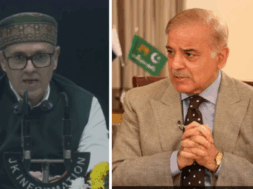
Roving Periscope: “Narrow view,” EAM remarks after the US warning to India on Chabahar
Virendra Pandit
New Delhi: A day after the US warned India of a “potential risk of sanctions” in the wake of the India-Iran 10-year deal for running the Chabahar Port in the Gulf nation, External Affairs Minister S Jaishankar said this project will benefit the entire region and people should not take a “narrow view.”
Dr. Jaishankar pointed out that the US itself had in the past appreciated Chabahar’s larger relevance.
India Ports Global Ltd (IPGL) and the Ports and Maritime Organisation (PMO) of Iran on Monday signed the Long-Term Bilateral Contract on Chabahar Port, enabling the operation of the Shahid Beheshti Port terminal in the Chabahar Port Development Project for 10 years.
India’s bilateral contract with Iran may attract an investment of USD 370 million, comprising a direct investment of USD 120 million from India for infrastructure development and a USD 250 million line of credit to Iran. The deal can be extended by mutual consent, the media reported.
Reacting to the US warning, Dr. Jaishankar said, “I did see some of the remarks, but I think it’s a question of communicating, convincing, and getting people to understand that this is actually for everyone’s benefit.”
Then he added” “I don’t think people should take a narrow view of it.”
“They (US) have not done so in the past. So, if you look at the US attitude towards Chabahar, it appreciated that this port has a larger relevance… we will work on it.”
“We have had a long association with the Chabahar Port, but we could never sign a long-term agreement. The reason was… there were various problems on the Iranian end… the joint-venture partner changed, the conditions changed,” the EAM said.
New Delhi sorted out the issues and signed the long-term agreement, which would benefit the entire region, he added.
“The long-term agreement is necessary because without it you cannot improve the port operation, which, we believe, will benefit the entire region.”
In 2018, IPGL took over a part of the operations at Shahid Beheshti. India operated the port on a short-term agreement, which had to be renewed periodically. This and Iran’s geopolitical tensions kept shipping companies and investors away from Chabahar.
The bilateral negotiations between India and Iran faced a deadlock after Tehran refused to agree to an international arbitration framework, citing the need for a constitutional amendment. Most of the contentious clauses, including arbitration, have now been sorted out.
The US warned on Monday that any country having business dealings with Iran runs the “potential risk of sanctions,” noting that it was aware that Tehran and New Delhi had signed a deal on Chabahar port. The warning came despite Chabahar Port being previously exempt from US sanctions.
“We’re aware of these reports that Iran and India have signed a deal concerning the Chabahar port. I will let the government of India speak to its own foreign policy goals vis-a-vis the Chabahar port as well as its bilateral relationship with Iran,” US State Department Deputy Spokesperson Vedant Patel said.
“I will just say, as it relates to the United States, US sanctions on Iran remain in place and we’ll continue to enforce them.”
When asked whether these sanctions would apply against Indian firms as well, Patel said, “You’ve heard us say this in several instances, that any entity, anyone considering business deals with Iran, they need to be aware of the potential risk that they are opening themselves up to and the potential risk of sanctions.”
Whether there was any specific exemption for the latest agreement between India and Iran on Chabahar, Patel gave a single-word answer: “No.”
India has invested in the Chabahar port’s infrastructure and upgraded facilities to make it a viable transit route for Indian goods bound for Afghanistan and Central Asia. While India has been a key player in Chabahar’s development since 2003, US sanctions on Iran over its nuclear program slowed down the development of the port.
In November 2018, despite Washington imposing tough sanctions on Iran, then-US President Donald Trump exempted India from certain sanctions for the development of the Chabahar port and the construction of a railway line connecting it with Afghanistan. This recognized India’s role in the development of the Chabahar port as of strategic importance for Afghanistan.
An India-Iran flagship project located at the mouth of the Gulf of Oman, the Chabahar Port offers India an alternative route for trade with landlocked Afghanistan and Central Asia, as Pakistan has denied India land access to these regions. It is also considered a gateway for unlocking India’s trade potential with European countries since Chabahar is part of the proposed International North-South Transport Corridor (INSTC).











